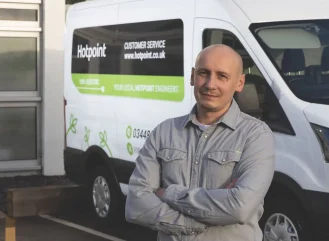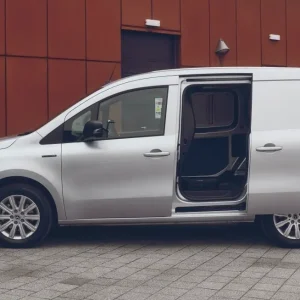
Cole Pemberton has been making waves at Hotpoint UK for the past three years as fleet operations manager. His role involves overseeing the company’s service vans and cars across the UK and Ireland.
Previously, Pemberton worked as an area service manager, leading teams of engineers across the south and southwest regions. But, today, his focus has shifted to managing the company’s fleet, a crucial aspect of Hotpoint’s business operations, which are largely driven by their vans.
“We’re quite an old school operation, from a fleet perspective,” Pemberton says. Unlike many companies that delegate fleet management responsibilities to HR or procurement departments, Hotpoint UK gives Pemberton full autonomy. He oversees everything from vehicle disposals and reissues to the coordination of installing racking systems for service vans, ensuring that vehicles are optimised for service engineers. This hands-on role makes each day in his job a unique experience.
A small, efficient team
Despite his significant responsibilities, Pemberton doesn’t do it all alone. He leads a small but efficient team, each member handling specific tasks to ensure smooth fleet operations. One person manages the company’s car program, handling fuel cards and tyre issues for company car drivers, while another oversees new driver onboarding, vehicle insurance and accident management. “My job is to stitch all these moving parts together and develop a strategy for our EV transition,” Pemberton explains.
Managing a complex fleet
Hotpoint’s fleet is diverse, consisting of 130 job-need vehicles, with a range of drivers from senior managers and directors to sales teams and engineers. The fleet also includes a significant number of vans for the service engineers who maintain Hotpoint’s products in customers’ homes.
Pemberton highlights that the service vans form the backbone of the business, ensuring smooth operations across various functions. “Our vans are primarily used by service engineers, with a select few dedicated to home deliveries,” explains Pemberton. “The majority of our fleet consists of medium-sized, fully customised transporters.”
In a significant step towards modernising the fleet, the company has embraced electric vehicles. “We introduced 40 electric Transit vans, regarded as the best in the market, to evaluate their real-world performance.” This shift, driven by Pemberton’s leadership, has resulted in impressive growth. Since May 2021, the fleet now includes 66 electric cars, 40 electric vans and 130 hybrid vehicles, with 30 more electric Ford Transit Customs set to join soon.
Navigating the challenges of electrification
When he first stepped into his role, Pemberton says the biggest challenge was the sheer complexity of managing a service fleet. “I knew how to manage a budget, but transitioning into fleet management was a whole new world,” he recalls.
Electrification was one of the first major tasks he tackled, as it had never been done before at Hotpoint. “No one in the company had done it before, and there was no one to learn from, so I had to immediately order electric cars without a proper ordering platform or policy in place,” he says. With an overlap period from the previous fleet manager, Pemberton quickly learned that fleet management is far more intricate than it appears.
But Pemberton didn’t shy away from the challenge. “No one in the company had done it before, so I had to take the reins and make it happen,” he says. Over time, he streamlined the process, implementing fleet software to replace the outdated Excel-based system. This was a game-changer, allowing him to manage fleet operations more efficiently and strategically.
A fluid strategy for EV integration
One of the main challenges in the switch to electric vans has been addressing the habits and preferences of the drivers, Pemberton explains.
While Hotpoint UK has set ambitious targets for fleet electrification, the market realities have complicated the transition. “We wanted a full Ford fleet, but the market didn’t have the options we needed,” Pemberton explains. He spent much of the first year testing available EVs, many of which proved unsuitable due to size constraints or lack of practicality for the engineers’ needs. The Ford E-Transit eventually emerged as a viable option, offering a good balance between performance and size.
“For our engineers, the vehicle isn’t a workspace – it’s simply a tool to get from job to job,” Pemberton says. With engineers spending 35-45% of their day driving and completing up to 22 jobs, ensuring their comfort with electric vehicles was crucial. “Many had never driven an automatic before, let alone an electric vehicle. There’s no engine noise, and the acceleration feels different. We had to guide them through even basic things, like adjusting the seat or pressing the start button.”
Drawing on his own background as a former engineer, Pemberton had a clear understanding of what the vans needed. “I measured the stock we carry and designed the racking for the new vans accordingly. It was crucial to account for the practicalities and preferences of our engineers. The challenge wasn’t finding the right vehicle, but ensuring it met the drivers’ needs.”
Despite the progress, Pemberton is realistic about the challenges of electrification. “The infrastructure isn’t there yet, especially when it comes to home charging for our engineers,” he says. Many engineers can’t install chargers at home due to rental agreements or other logistical issues. Hotpoint covers the cost of installation, but if an engineer leaves the company within two years, they’re expected to repay the expense. This has made home charging a complex and often impractical solution.
To mitigate these issues, Pemberton has explored alternatives, including plug-in hybrid vehicles. “Hybrid vehicles could offer a more practical option, especially for engineers who don’t have easy access to charging stations,” he notes.
After testing numerous electric vehicles, Pemberton found the Ford E-Transit to be a viable option. “It wasn’t perfect, but it was a great stopgap while waiting for the newer E-Custom to be released,” he says.
As Hotpoint UK moves forward under the ownership of Beko Europe, Pemberton is dedicated to leading the fleet toward a more sustainable future. With EVs central to his strategy, he’s committed to reducing the company’s carbon footprint and making the transition as smooth as possible. For Pemberton, it’s all part of the job.
The evolving role of the fleet manager
Pemberton quickly discovered that fleet management is more intricate than it seems. “A lot of people don’t realise how involved it is,” he says. “I spend a week and a half each month just on invoicing – handling eight suppliers across two markets, managing both cars and vans. Then there’s ensuring the right vans go to the right engineers at the right time, negotiating contracts, and handling escalations of servicing and repairs.”
Managing Hotpoint UK’s fleet goes beyond just distributing vehicles, especially with the shift to electric ones. “Electric vehicles require a different focus,” Pemberton notes. “I handle everything from ensuring the right vehicles are assigned to the right engineers in the right geographic areas to negotiating with leasing companies and OEMs.”
One major change Pemberton implemented was fleet software across European markets. “Everything was on Excel spreadsheets when I joined,” he explains. “Implementing fleet software streamlined the process.”
Pemberton quickly recognised the need for smarter, more efficient management. “If something doesn’t make sense or is done purely because it’s always been that way, it’s probably outdated,” he says.
Fleet management, once seen as a secondary concern, is now crucial. “It was a dirty word in the room, focused solely on bottom line costs,” Pemberton says. “Now, my decisions have a significant impact on the business. I’m very fortunate that my manager and the business leaders understand this and see not only the challenges but the future opportunities.”
The changing age profile of engineers is also influencing vehicle choices. “Younger engineers need vehicles that align with their preferences, especially around powertrain, which may cost more,” Pemberton explains. “With everything going hybrid or electric, we must justify these costs.”
Fleet management now also involves treating people differently. “We need to accommodate engineers’ needs, including time for charging their vehicles in some cases,” Pemberton says. “We can’t deny overtime for searching for a charger.”
The role of fleet managers is also evolving within companies. “Fleet is becoming more comprehensive,” Pemberton notes. “Companies are hiring dedicated fleet managers again who must engage with the industry. For engineers, managing a fleet involves working with HR and procurement to update policies.”
Pemberton finds this comprehensive involvement both challenging and rewarding. “I enjoy fleet management because it covers many aspects, and you need to understand everyone in the business,” he adds.
Managing fleet costs in a post-pandemic world
In addition to navigating the transition to electric vehicles, Pemberton has had to contend with rising fleet costs, particularly in the wake of the Covid-19 pandemic.
“The cost of leasing a van has skyrocketed,” he says. Vans that used to cost £200 per month now cost upwards of £490, a significant increase that has forced Pemberton to adjust his budgeting strategies.
One way he’s managing these rising costs is by optimising vehicle mileage. “We set our annual mileage limit at 17,000 miles instead of 17,500 to ensure we stay within our service thresholds,” Pemberton explains. This small adjustment helps lower maintenance costs over the lifespan of each vehicle.
However, rising fuel prices continue to be a challenge. To address this, Pemberton has implemented measures to improve fuel efficiency, including a new database that tracks where engineers refuel. “If all our engineers had used BP stations instead of third-party stations where we pay pump prices, we could have saved around £300,000 to £400,000,” he says.
The future of hydrogen and alternative fuels
While Pemberton is committed to Hotpoint’s electrification strategy, he remains open to exploring alternative fuels, including hydrogen. “Hydrogen is a potential solution, but realistically, it’s only going to be for HGVs,” he says. Hydrogen technology has made little progress over the years, and the infrastructure needed to support hydrogen refuelling remains limited.
Instead, Pemberton sees more promise in plug-in hybrids and Hydrotreated Vegetable Oil (HVO), though both come with their own challenges. “HVO is expensive and not widely available,” he explains. But he continues to keep a close eye on developments in the industry, participating in advisory boards and collaborating with professionals to stay informed about the latest technologies.
A focus on sustainability and efficiency
For Pemberton, fleet management isn’t just about maintaining vehicles – it’s about driving sustainability and efficiency. As Hotpoint UK moves forward under the Beko Europe umbrella, Pemberton’s focus remains on reducing the company’s carbon footprint while keeping costs under control.
“We’re aiming to be a green, sustainable company, and part of that is transitioning away from diesel,” he says. With most of the fleet already electric or hybrid, and only a handful of diesel vehicles remaining, Hotpoint is well on its way to achieving its sustainability goals.
However, Pemberton remains pragmatic about the role of electric vehicles in the broader sustainability picture. “I drive electric cars and love them, but I don’t think they’re the silver bullet to saving the world,” he says. For him, sustainability is about finding the best solutions for the business, whether that means electric vehicles, hybrids, or alternative fuels.
Making every penny count
With fleet costs continuing to rise, Pemberton is focused on making every penny count. “It’s not just about saving costs; it’s about avoiding unnecessary expenses,” he says. By implementing creative solutions, optimising mileage, and closely monitoring fuel usage, Pemberton ensures that Hotpoint’s fleet remains both efficient and cost-effective.
In the ever-evolving world of fleet management, Cole Pemberton is leading the charge for Hotpoint UK, driving innovation, sustainability, and efficiency every step of the way.





